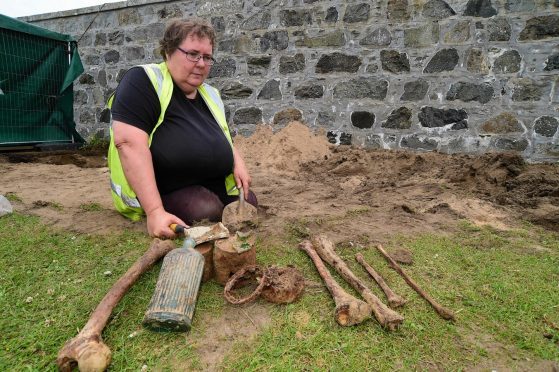Archaeologists have been left “puzzled” after discovering skeletons unearthed by gravediggers at a north-east cemetery were reburied from elsewhere.
Bones from at least three different bodies were discovered as staff at Kirkton Cemetery in Fraserburgh opened a new burial plot earlier this month.
Initially police were alerted but officers quickly established the remains were “archaeological” and not connected to any form of recent criminal activity.
Yesterday a team of archaeologists visited the site to investigate the findings. They discovered the remains of at least three individuals – one young female, one male and another as yet unidentified person.
Also found were tins and bottles dating back around 100 years.
Last night Alison Cameron, who was leading the dig, said: “We found they were not in situ and had been moved before.
Someone had dug a trench and put the bones in there along with tins and bottles from the early 20th century.
“I would imagine it was to do with agricultural activity – the farmer found these bones and buried them in a trench.”
The Aberdeen-based archaeology expert said the remains may be early burials from a 13th century church which once stood in the area.
“It’s a bit of an off one,” she added. “I was thinking we would find medieval graves. It is obviously something of interest.
“We’ve still got a bit of a puzzle on our hands.”
The remains which were unearthed previously were taken to a mortuary in Aberdeen but neither they nor the bones exhumed yesterday show any sign of damage or disease.
This makes dating and identifying the remains more challenging.
Further studies of the remains and surrounding area are expected to be carried out in the coming weeks.
Kirkton Cemetery, on the eastern edge of the port town, is an expansion of the former Philorth Church burial ground.
It contains 31 Commonwealth burials from World War I and 30 burials from World War II.
Kirkton also has the grave of Joseph Watt, a Royal Navy reserve who was awarded the Victoria Cross in 1917. He died in 1955.
